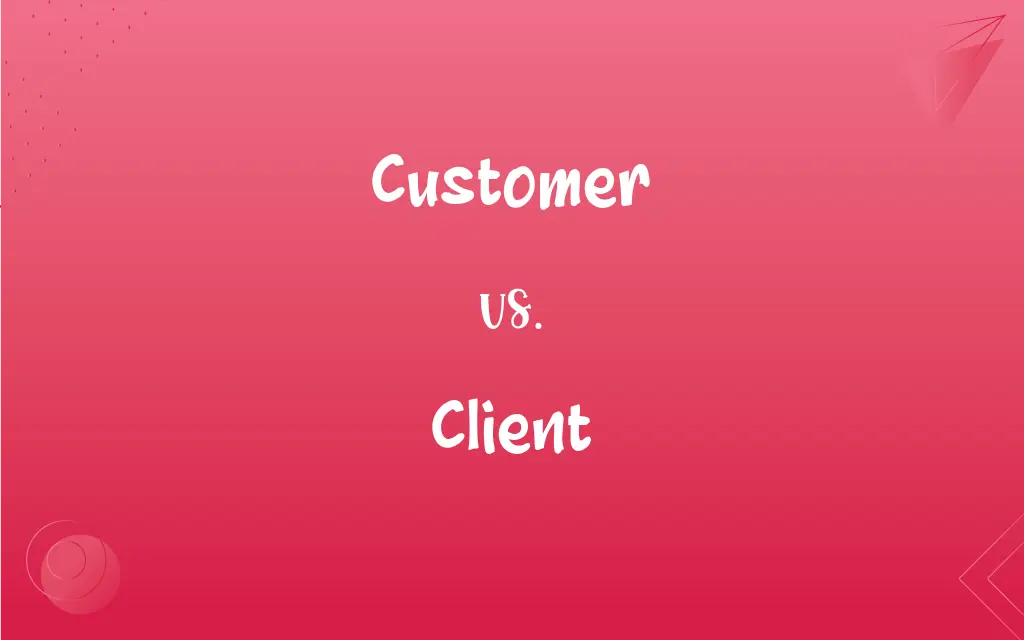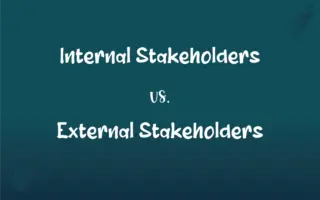Customer vs. Client: What's the Difference?
Edited by Janet White || By Harlon Moss || Updated on October 22, 2023
A customer buys goods or services, often on a one-time basis. A client seeks professional advice or services, usually over an extended period.

Key Differences
A customer typically refers to someone who makes a purchase, be it a product or a service. They might not have a long-term or continuous relationship with the business. For instance, when you go to a supermarket and buy groceries, you're a customer. On the other hand, a client is generally someone who seeks professional services or advice and tends to have an ongoing relationship with the service provider. Think of lawyers or consultants – their "customers" are more appropriately termed "clients" because of the prolonged and specialized nature of the relationship.
Another distinction lies in the depth of the relationship. A customer usually engages in a transactional interaction. They receive a good or service in exchange for payment. Once the transaction is complete, the relationship may end unless the customer decides to make another purchase. A client, in contrast, typically has a deeper, more personalized relationship with the service provider. This might involve trust, regular communication, and a tailored service.
In terms of dependency, customers might have numerous options to choose from and can easily switch to another provider if they find a better deal or are dissatisfied with their purchase. Clients, however, often depend more heavily on their service provider, given the specialized nature of the services they receive.
Comparison Chart
Nature of Relation
Transactional
Prolonged and specialized
Duration
Short-term or one-time
Long-term or ongoing
ADVERTISEMENT
Depth of Interaction
Basic exchange of goods or services
Deeper, more personalized interaction
Choice & Dependency
Can easily switch providers, many options available
Heavier dependency, fewer alternatives due to specialization
Example
Someone buying a coffee at a café
Someone hiring an attorney for legal representation over several months
Customer and Client Definitions
Customer
A person or organization that buys products from a store or business.
The shop owner greeted the regular customer warmly.
Client
Someone under the patronage, protection, or care of another.
The counselor had several clients seeking advice on personal issues.
ADVERTISEMENT
Customer
A person one has to deal with in a specific context.
As a teacher, every student is a potential customer.
Client
A computer or device that accesses services from another computer system.
The client software connects to the server to retrieve data.
Customer
An individual receiving a particular service.
The internet company has over a million customers.
Client
A customer, especially one engaging the services of a professional.
The advertising agency landed a big client last month.
Customer
A person who purchases goods or services.
The customer paid for her groceries and left the store.
Client
A person or organization using the services of a professional person or company.
The lawyer met with his client to discuss the case.
Customer
Someone who frequently buys from a particular seller.
She's a loyal customer of that boutique.
Client
A person being represented in a legal or professional matter.
The therapist ensured confidentiality for her client.
Customer
One that buys goods or services, as from a store or business.
Client
The party for which professional services are rendered, as by an attorney.
FAQs
Is a person buying a book from a bookstore a customer or client?
They are a customer.
Can a business have both customers and clients?
Yes, depending on the nature and range of services/products they offer.
Can a person be both a customer and client to the same business?
Yes, depending on the types of interactions and transactions involved.
Is every client also a customer?
Not necessarily, but a client can be considered a specialized type of customer.
Does a customer always make a purchase?
Typically, yes, a customer engages in buying goods or services.
In what context might a student be considered a customer?
When referring to those they interact with or "serve", like teachers or institutions.
Are the terms more prevalent in certain industries?
Yes, "client" is common in professional services, while "customer" is used in retail.
Which word indicates a more prolonged relationship, customer or client?
Client indicates a more prolonged relationship.
If I hire a consultant for a year-long project, am I a customer or client?
You are a client.
Can the terms customer and client be used interchangeably?
Sometimes, but not always. Context matters.
In IT, what does a client refer to?
It refers to a computer or device accessing services from another system.
Do clients generally require more personalized services than customers?
Yes, clients often receive more tailored and specialized services.
Who generally has a broader range of choices, a customer or client?
Customers typically have a broader range of choices.
Which term, customer or client, emphasizes a deeper trust?
Client often implies a deeper trust and relationship.
Is a bank account holder a customer or client?
They can be referred to as both, but "customer" is more commonly used.
Can a software application have clients?
Yes, in tech terminology, applications accessing services from other apps are "clients".
In a restaurant, are diners customers or clients?
They are usually referred to as customers.
If someone buys a one-time legal consultation, are they a customer or client?
They can be considered both, but "client" is more appropriate due to the professional context.
Do businesses value customers and clients differently?
Both are valuable, but the relationships and strategies might differ.
Do businesses use the terms to indicate levels of loyalty?
Not explicitly, but "client" often suggests a more consistent and ongoing relationship.
About Author
Written by
Harlon MossHarlon is a seasoned quality moderator and accomplished content writer for Difference Wiki. An alumnus of the prestigious University of California, he earned his degree in Computer Science. Leveraging his academic background, Harlon brings a meticulous and informed perspective to his work, ensuring content accuracy and excellence.
Edited by
Janet WhiteJanet White has been an esteemed writer and blogger for Difference Wiki. Holding a Master's degree in Science and Medical Journalism from the prestigious Boston University, she has consistently demonstrated her expertise and passion for her field. When she's not immersed in her work, Janet relishes her time exercising, delving into a good book, and cherishing moments with friends and family.































































